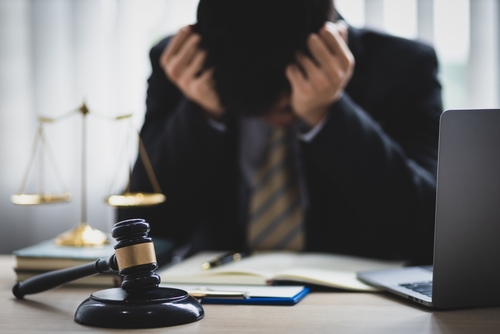Irregular hours could be detrimental to solo lawyers’ mental health, new Clio report says

Image from Shutterstock.
A majority of solo lawyers want flexibility to set their hours, but working irregular and extended hours could come at the expense of their mental health, according to Clio’s 2023 Legal Trends for Solo Law Firms report.
The report was published April 18 by the practice management software company and was based on a fresh analysis of data from the 2022 Legal Trends Report, which found that about one in five lawyers left a job as part of the “Great Resignation,” or the “Great Reshuffle,” and that better pay and work-life balance were top priorities for lawyers who moved on.
And 31% of lawyers who quit their law firms set up solo practices, according to the new report. In addition, a majority of solo lawyers, or 62%, prefer working from home, 50% prefer to meet clients virtually, and 89% want to work outside typical workday hours.
But the report suggests that irregular working hours are impacting lawyers’ mental health. While it found that 81% reported “positive mental and emotional wellness” when they worked regular hours, “nearly half of those working irregular schedules couldn’t say the same,” according to the report.
“As solos embrace more flexible work schedules, it’s often at the expense of time management, earnings for their firms and, most concerningly, their mental health,” according to the report, which surveyed 1,134 U.S. legal professionals, 458 U.S. nonlegal professionals and 1,168 U.S. consumers.
Joshua Lenon, lawyer in residence at Clio, told the ABA Journal that there is a “huge disparity” between solo lawyers who work regular hours and those who work outside traditional workday hours.
Lenon says the administrative demands of running a solo firm and the additional roles that lawyers take on to develop and market their businesses also add “unique stressors.”
“When you pile them together, you’re finding that a lot of solos are just taking on too much at once,” Lenon says.
Clio’s report suggests that solos are as likely as lawyers working at larger firms to report working more than 40 hours per week. It found that more than half, or 54%, report working on Saturdays and 40% on Sundays.
“While the freedom to choose their own hours is likely a major perk of being a solo lawyer, many also want to live and enjoy their lives outside of work. Despite these preferences, however, solos are much more likely than lawyers working at larger firms to work beyond 6 p.m.,” according to the report.
Lenon argues that technology, including practice management software, has a role in addressing mental health and wellness by helping overburdened solos with scheduling, messaging, document management and a host of other tasks.
“It just reduces a bit of the administrative burden that solo lawyers take upon themselves,” Lenon says. “When we limit that burden, we get to have some boundaries that reduce that mental and emotional stress.”
However, the report suggests that when it comes to adopting technology, solos are ahead of their larger counterparts. It found that 85% of solo lawyers use cloud-based legal practice management software for their work, as opposed to 55% of lawyers who are not solo.
The report also found that since 2019, lawyers at larger firms have typically charged 20% more per hour than solos. But solo lawyers have lower overhead costs, and these savings can be passed on to clients. This may give solos a competitive edge, the report suggests.
According to the report, solos have realization rates that are 1% to 3% lower than larger firms, and collection rates are 2% lower.
“These lower realization rates mean that, in comparison, solos have a harder time billing for their time and collecting on what they are owed,” according to the report.
The report also found that while hourly rates are rising for solos, they “haven’t kept pace with inflation,” noting that for solos and larger firms to keep up, they would need to increase their rates by $12 per hour.
Sidebar
• Directory of Lawyer Assistance Programs
• ABA Commission on Lawyer Assistance Programs
• The Well-Being Toolkit for Lawyers and Legal Employers is at ABAJournal.com/toolkit.
• The Suicide & Crisis Lifeline is 988.



